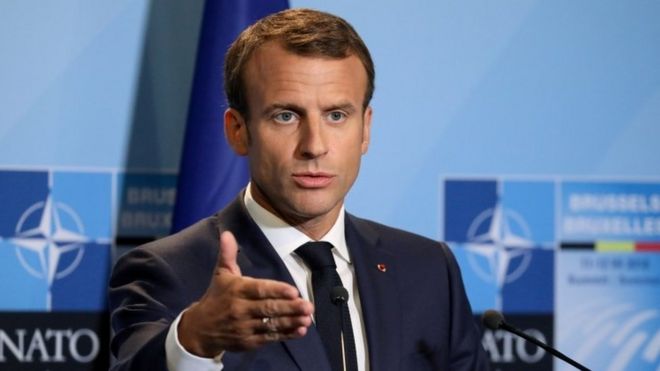Nato alliance experiencing brain death, says Macron
President Emmanuel Macron of France
has described Nato as "brain dead", stressing what he sees as waning
commitment to the transatlantic alliance by its main guarantor, the US.
Interviewed by the Economist, he cited the US failure to consult Nato before pulling forces out of northern Syria.He also questioned whether Nato was still committed to collective defence.
German Chancellor Angela Merkel, a key ally, said she disagreed with Mr Macron's "drastic words".
Russia, which sees Nato as a threat to its security, welcomed the French president's comments as "truthful words".
Nato, which celebrates 70 years since its founding at a London summit next month, has responded by saying the alliance remains strong.
What else did the French president say?
"What we are currently experiencing is the brain death of Nato," Mr Macron told the London-based newspaper.He warned European members that they could no longer rely on the US to defend the alliance, established at the start of the Cold War to bolster Western European and North American security.
The alliance, Mr Macron is quoted as saying, "only works if the guarantor of last resort functions as such. I'd argue that we should reassess the reality of what Nato is in the light of the commitment of the United States".
The French leader urged Europe to start thinking of itself as a "geopolitical power" to ensure it remained "in control" of its destiny.
What reaction has there been?
Mrs Merkel was speaking in Berlin alongside the visiting Nato Secretary-General Jens Stoltenberg.Mr Macron "used drastic words - that is not my view of co-operation in Nato," she said.
Mrs Merkel acknowledged there were problems, but said she did not think "such sweeping judgements are necessary".
"Nato remains a cornerstone of our security," she added.
Russia's reaction came from foreign ministry spokeswoman Maria Zakharova.
"Well said. Truthful words, and ones that get to the nub of the matter," she posted on Facebook.
"An accurate description of Nato's current state," she wrote.
https://www.bbc.com/news/world-europe-50335257





Post a Comment